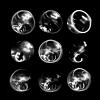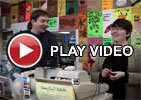Ryan Teague, "Coins & Crosses"
 Unlike most composers working with electronics, Teague does not use them as his primary instruments or as part of difficult, academic studies. Instead he composes straightforward scores for ordinary orchestras and includes electronics like any regular composer would include other traditional instruments. For most of the pieces, the electronics take the back seat and are used only to embellish the piece like any other instrument. The end result is a nice but fairly uneventful album.
Unlike most composers working with electronics, Teague does not use them as his primary instruments or as part of difficult, academic studies. Instead he composes straightforward scores for ordinary orchestras and includes electronics like any regular composer would include other traditional instruments. For most of the pieces, the electronics take the back seat and are used only to embellish the piece like any other instrument. The end result is a nice but fairly uneventful album.
Type
All of the pieces are recorded beautifully; Teague makes pleasant, subtle use of dynamics and the album is rich in sound so from that aspect it is a treat for the ears. However, many of the pieces are too much on the schmaltzy Holywood score side of things for me to fully engage with. It's not bad but not particularly interesting. The opening piece, "Introit," is reminiscent of Ennio Morricone's score for The Mission but Teague does not demonstrate the gentle power of Morricone's work. That is not to say that Teague has no power but he is reserved for my tastes. Many of the pieces like "Nephesch" and the two "Tableau" pieces would be run of the mill scores were it not for a few beats or synths on top. The former starts to come into its own towards the end but it is too late in the game for the piece to be fully redeemed. The "Tableau" pieces could be any Danny Elfman soundtrack that has been slightly scratched.
There are a couple of pieces on Coins & Crosses that engaged me. "Accidia" is where Teague makes best use of electronics. After an almost stereotypic orchestral start, synthesisers overwhelm the piece for a short while before the both elements fuse together to sound like a broken music box. It is lovely stuff to say the least. "Fantasia for Strings" (which features no electronics) is a straightforward orchestral composition and is an enjoyable if unoriginal piece. There is no aural signature here for the piece to be identified as a work of Teague's; it could be anyone. That being said, it is pleasant to listen to and is one of the only pieces on the record that works as a piece of music in its own right, the rest of them feel like they are missing something integral.
I feel that Teague could make some nice soundtracks that would work well provided there is a suitable context. As pieces of music on their own, there is not a lot here to set him apart from any working composer. I do not mean to harp on about it all sounding like a soundtrack but many of the pieces have this huge void in them like there is meant to be something accompanying the music. I would be interested to see where he goes from here, there is potential but I feel Teague slightly missed the mark on Coins & Crosses.
samples:



